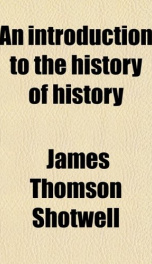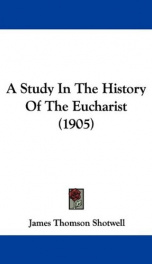an introduction to the history of history

Purchase of this book includes free trial access to www.million-books.com where you can read more than a million books for free. This is an OCR edition with typos. Excerpt from book: SECTION II JEWISH HISTORY CHAPTER VH THE OLD TESTAMENT AS HISTORY When we turn from these poor and thin records of the great empires of the East to the history of that little branch of the Semites which clung to the perilous post on the land-bridge between the Euphrates and the Nile, the Hebrews of Palestine, we are struck at once with the comparative wealth of its national annals. In contrast with the product of Egypt or Babylonia, the Bible stands out as an epoch-making achievement. A composite work of many centuries, filled with much that the historian rejects, it yet embodies the first historical work of genuinely national importance which has come down to us.1 Higher criticism has robbed it of its unique distinction as a special revelation of Jehovah, denied the historicity of its account of the Creation and destroyed the claim of the legends of the patriarchs to be regarded as authentic; the great name of Moses disappears as the author of the Pentateuch, and that of David from the book of Psalms; the story of Joseph becomes a romance, the Decalogue a statement of late prophetic ideals; the old familiar books dissolve into their component parts, 1 The treatment of the historical records of the Jews is here taken up from the standpoint of the completed output, the Bible as we now have it. This is mainly for the sake of clarity. A more historical treatment would be to begin with the elements as thev existed in the earliest days and bring the story down, as it really happened, instead of going backwards, analyzing the completed text. This historical treatment has been admirably followed out by H. Schmidt in his booklet in the Rr- KgionsgeschichtKche VoHubilchcr series (Series II, No. 16), entitled Die Geschichts- schreibung im alten Testament (1911). The volume by J...
Info about the book
Author:
Series:
Unknown
ISBN:
0495810762
Rating:
4.5/5 (5)Your rating:
0/5
Languge:
English
Users who have this book
Users who want this book
What readers are saying
What do you think? Write your own comment on this book!
write a commentif you like an introduction to the history of history try:
Do you want to exchange books? It’s EASY!
Get registered and find other users who want to give their favourite books to good hands!




